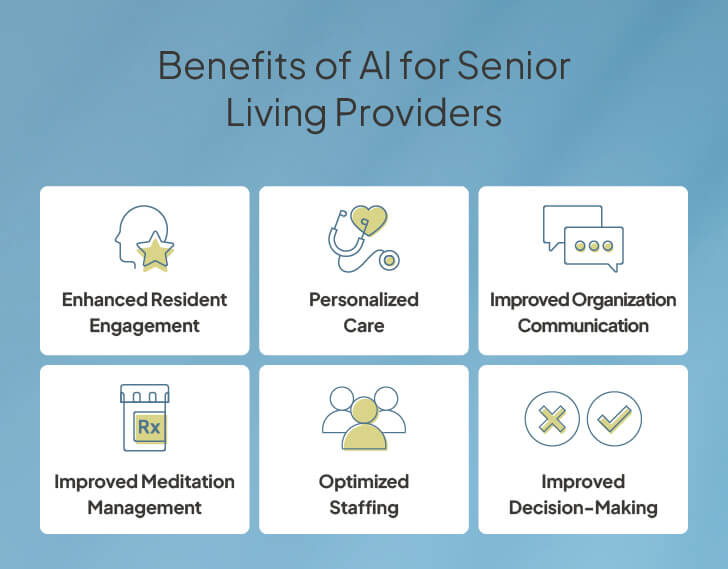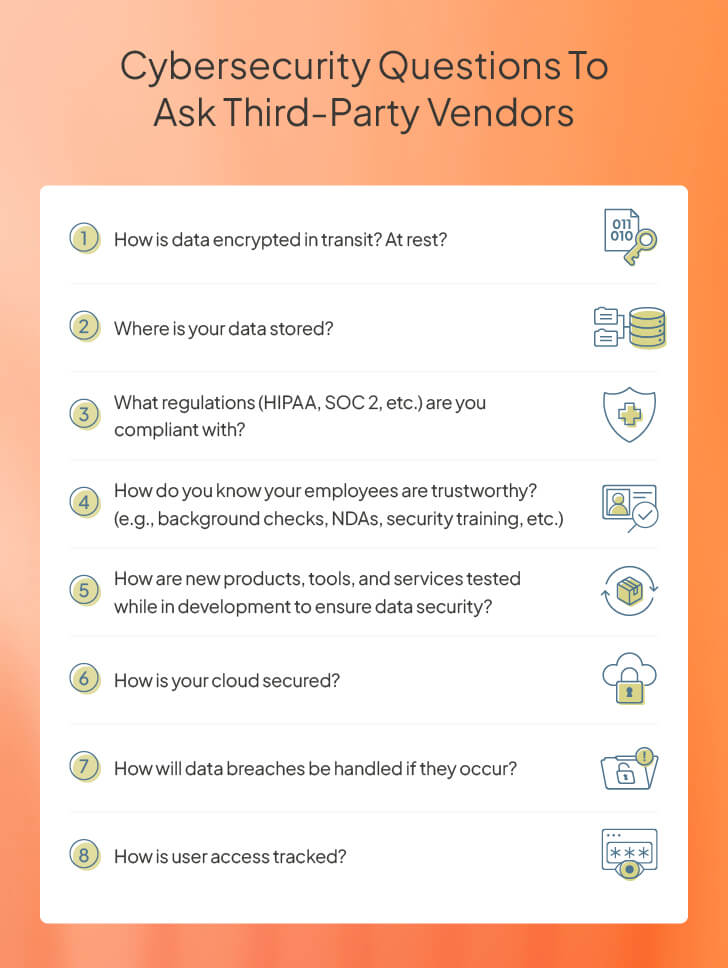AI in Senior Living: Transforming Operations in 2025
Learn how AI can improve your senior living community.

Learn how AI can improve your senior living community.
Published on: October 14, 2024
Last updated: May 22, 2025

Senior living software collects extensive data on prospects and residents, providing a solid foundation for operators to make smarter, more informed decisions and enhance resident care.
By strategically integrating AI into this framework, communities can leverage these insights to minimize human errors, quickly pinpoint issues, and craft effective solutions, further optimizing both operations and care quality for a competitive edge in the market.
There are four components of AI applicable to senior living:
Adopting senior living AI into the day-to-day operations of your community benefits everyone, from owners and operators to investors, staff, and even residents. Some of the biggest benefits of using AI in your community include:

You can integrate AI into many different areas of your senior living community to optimize operations and stay ahead of senior living trends. Here are four potential applications.
AI is only as good as the people using it, and there are many ethical considerations every senior living owner or operator must consider.
Health care data is a common target for data breaches with 725 health care data breaches occurring in 2023, impacting more than 110 million records. Senior living is particularly vulnerable since it includes financial data, medical records, Social Security numbers, and other sensitive data for residents, so cybersecurity for senior living is of the utmost importance.
As the use of AI in senior living increases, providers must be hypervigilant about how they protect the data of their residents and employees.

AI learns from experience just like a human, which means it’s susceptible to misinformation. For example, if you teach a child to identify a dog but only show them images of brown dogs, they’ll assume all dogs are brown. That’s a bias.
If AI receives faulty data, it can develop a biased algorithm, leading to errors in analysis and recommendations. For example, if AI only analyzes data related to memory care and then you ask it to interpret data related to independent living, it might predict a different set of financial outcomes than if it had experience with both acuity levels.
In short, if you want to leverage data to embark on a path to better resident care and streamlined operations, you need to use AI wisely.
To prevent an algorithmic bias, senior living providers should follow these guidelines:
Just like a human might perceive elements that aren’t present, AI can generate incorrect or misleading information. This can occur with language generation, such as creating nonsensical statements; image generation, such as creating an unrealistic image; and recommendation systems, such as generating irrelevant or harmful suggestions.
These hallucinations occur when the AI model lacks sufficient training data or learns an algorithmic bias. Overfitting, or when AI relies too heavily on training data, can also cause AI hallucinations when AI receives too much new data.
To prevent AI hallucinations, senior living providers should do the following:
AI is developing rapidly, and you must monitor emerging trends and industry best practices to protect your residents and employees.
In senior living specifically, the future of AI is:
Aline believes data is the key to success in senior living, which is why we provide senior living operators with the best technology and the largest dataset. As a result, you have the solutions and resources at your fingertips to make smarter, more informed decisions rooted in data.
To continue pushing senior living software into the future, Aline Intelligence, a powerful AI that works across our entire suite of applications, to simplify operations and enhance the resident experience — schedule a demo today to learn more.


Amanda McGrory-Dixon
Amanda McGrory-Dixon is the content marketing manager at Aline, where she shares expert insights on how senior living communities can streamline operations, enhance resident satisfaction, and drive sustainable growth. With a deep understanding of industry trends and technology, she helps operators navigate challenges and implement data-driven strategies to improve efficiency, profitability, and care outcomes.
Blogs, stories and studies from the forefront of senior living operations

Lead generation surveys give senior living operators the data they need to understand their market, uncover new opportunities, and drive occupancy growth.

Prospect-centered selling helps senior living operators convert more leads and achieve occupancy goals through a more personalized, empathetic approach.

Gain insight into senior living pricing strategies for community success. Explore how Aline’s software optimizes revenue and operations

Overcome the biggest senior living financial challenges, including operational costs and occupancy rates, with interconnected software

Take a look at how senior living software options, like Aline, can elevate operations, resident care, and ROI

Enhance efficiency, accuracy, and resident satisfaction by integrating a POS system into your senior living dining operations
We’re using cookies on this site to improve your experience. Cookies help us learn how you interact with our website, and remember you when you come back so we can tailor it to your interests.
You can find out more about cookies and usage on our cookie policy page.
Some of these cookies are essential, while others help us to improve your experience by providing insights into how the site is being used.
For more detailed information on the cookies we use, please check our privacy policy
Your experience is important to us. We’re redirecting you to our new Aline website, where you’ll discover how our complete suite of senior living solutions can help you grow occupancy and revenue, optimize operations, and enhance resident care.
For more information, you’re welcome to read our statement on our merger. To continue your web experience, simply close this notification.
Your experience is important to us. We’re redirecting you to our new Aline website, where you’ll discover how our complete suite of senior living solutions can help you grow occupancy and revenue, optimize operations, and enhance resident care.
For more information, you’re welcome to read our statement on our merger. To continue your web experience, simply close this notification.
Your experience is important to us. We’re redirecting you to our new Aline website, where you’ll discover how our complete suite of senior living solutions can help you grow occupancy and revenue, optimize operations, and enhance resident care.
For more information, you’re welcome to read our statement on our merger. To continue your web experience, simply close this notification.
Your experience is important to us. We’re redirecting you to our new Aline website, where you’ll discover how our complete suite of senior living solutions can help you grow occupancy and revenue, optimize operations, and enhance resident care.
For more information, you’re welcome to read our statement on our merger. To continue your web experience, simply close this notification.
Aline Innovation Summit 2026: Registration Now Open!
Connect with senior living leaders, innovators, and industry peers May 11-13, 2026, in Frisco, TX to explore the latest innovations, proven strategies, and best practices shaping the future of senior living. View details and register today.